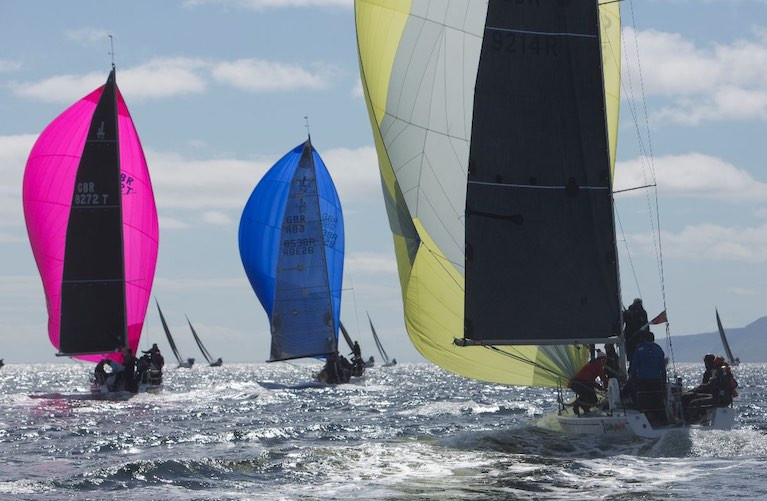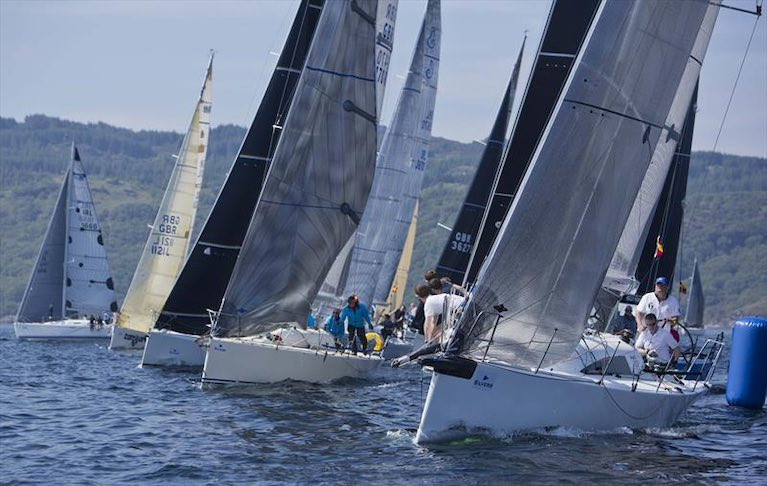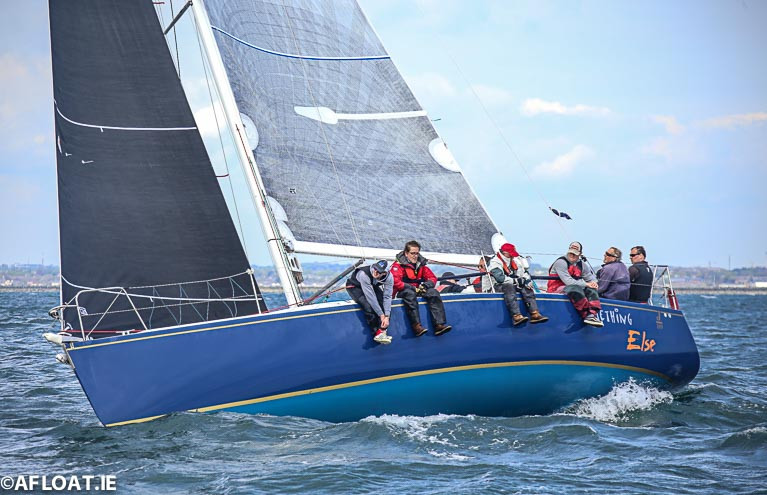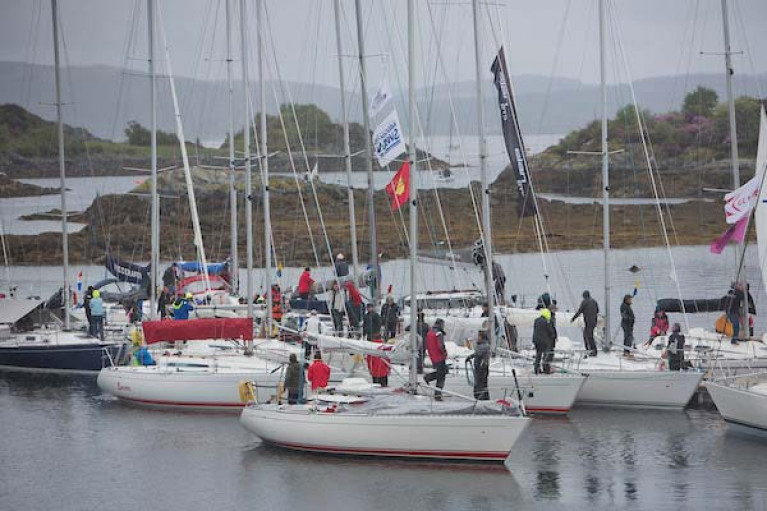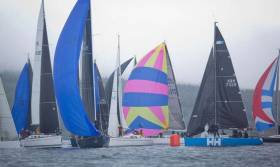Displaying items by tag: scottish series
Afloat Sailor of the Month for May John Minnis from Royal Ulster YC in Bangor on Belfast Lough has added yet another prize to his winnings with his First 31.7 Final Call taking the Causeway Cup for the best performance in the Scottish Series by a boat-based outside Scotland (other than the Series winner).
Final Call, with Gareth Flannigan driving, won Class 3 convincingly, counting two firsts and two seconds. Another Royal Ulster sailor, Flannigan, has credentials that span several classes, including Irish Laser Master's titles and wins with David Fletcher in the RS 400 class. No doubt there are many notable instances in which sailors decide to purchase a boat, but Minnis's decision, with his friend Brian Roche who has since moved on, to buy what was then Clever Clogs, was made during the emotion of the 2015 European Rugby Cup final between Munster and Glasgow Warriors at the Kingspan Stadium in Belfast. He says, " We felt this was a good call/decision and so renamed her Final Call. That big occasion in Belfast went the Warrior's way with a 31-13 scoreline in what was the great Paul O'Connell's last game for Munster.
 John Minnis of Royal Ulster is the Scottish Series 2021 Causeway Cup winning skipper
John Minnis of Royal Ulster is the Scottish Series 2021 Causeway Cup winning skipper
John Minnis isn't near finished, though, as he's off to the Beneteau First 31.7 Championships at the National Yacht Club in early July.
Minnis picked up Afloat's Sailor of the Month award for his Scottish Series achievement.
The passage across the North Channel from Belfast Lough to the Clyde for the 2021 Scottish Series was undoubtedly a worthwhile one for John Minnis in the Beneteau First 31.7 Final Call from Royal Ulster Yacht Club.
Racing at Inverkip in frustratingly light conditions and despite having to forgo the last race, two firsts and two seconds were enough by a comfortable four-point margin to take the first slot ahead of the Extrovert 22 Lady Ex.
In the same class, John Harrington's IMX 38 from the same club skippered by Ruan O' Tiarnaigh came fourth on equal points - 13 - with the quarter tonner Phoenix.
In Class 2, Shaun Douglas's First 40 .7 Game Changer, from Ballyholme Yacht Club, also on Belfast Lough, finished 5th in the nine boat Class 2 fleet racing in the Largs sector. His best result was a second place.
In the same fleet, Stuart Cranston's Ker 32 Hijacker tumbled to the bottom with a retiral resulting in three DNCs, in sharp contrast to its 2019 performance when the Strangford Lough entry from Down Cruising Club put in an enviable performance.
Commenting after the event John Minnis said, "It was fabulous that the Clyde Cruising Club was able to run the racing. Despite the trials Covid restrictions presented, it was run amazingly well."
Results are here
While there may have been nothing exactly like the current schedule-wrecking Pandemic before, in times past - nationally and internationally - we've come through comparable catastrophes. And enough of previous generations have survived to tell the tale and provide guidance when future generations are faced with a similar situation.
Cynics will of course gleefully leap on the fact that if enough of us hadn't lived through the Black Death or whatever, it would take millions of years before anything remotely resembling the human race evolved again. And if that was the case, we could only hope that the new wave of evolution would have come up with a premier species kitted out with something rather less troublesome than the current human body's problematic skeletal framework, plumbing arrangements, power systems and thought units.
Be that as it may, we meanwhile have to make the best of what we've got, and can only wonder at how generally unaware the current generations seemed to be pre-Pandemic of the appalling effects of the Spanish Flu piling in on the end of World War I a hundred years ago.
In fact, I knew of only one senior sailing man who ever even mentioned it, and that was Billy Doherty, who in the 1960s used to charter his 36ft 1912-built J B Kearney yawl Ainmara to groups of us when we were relatively penniless schoolboys and students, mad keen to go cruising from Belfast Lough under our own command.
 Billy Doherty of Donegal, the Godfather for a whole generation of young Belfast Lough sailors. It wasn't generally known that his lifeview was significantly shaped by narrowly surviving the Spanish flu pandemic of 1919. Photo: W M Nixon
Billy Doherty of Donegal, the Godfather for a whole generation of young Belfast Lough sailors. It wasn't generally known that his lifeview was significantly shaped by narrowly surviving the Spanish flu pandemic of 1919. Photo: W M Nixon
A Donegal man, Billy became a popular neighbourhood policeman in Belfast, augmenting his income with some beautiful building of clinker dinghies. His passion for boats was such that in 1957 he commuted his pension to raise the lump sum to buy Ainmara, and thus the modest £20 weekly charter fee he charged us actually played a significant role in keeping her going, even if he sometimes did have to wait until somebody's maiden aunt was generous at Christmas in order to make up the final total.
As for the boat's availability, the only unchangeable fixture in Billy's season was the annual regattas at the beginning of August back among his people along the Donegal shores of Lough Foyle, where he'd a couple of salmon-fishing licenses to exercise, and Ainmara was expected to be flagship as the Greencastle Yawls – also known as the "Drontheim Boats" as they were descended in design from standard boats imported from Trondheim in Norway – raced in fierce competition.
 The traditional Greencastle yawl evolved from a Norwegian type
The traditional Greencastle yawl evolved from a Norwegian type
Outside of that, for June and much of July Ainmara was tearing about the seas with young ne'er-do-wells aboard, taking in cruises to St Kilda and round Ireland, and somehow winning the 1964 Round Isle of Man Race overall too. In fact, we got so much out of the boat that some of us helped Billy and his son Wesley with the fitting-out, and over the years we became friends and talked of much.
But it was only once in an East Belfast pub that Billy mentioned he'd almost been a victim of the Spanish Flu. Typically of young Donegal men with limited futures, in 1919 aged around 17 he'd gone to Glasgow in search of work, and Glasgow being in the midst of the epidemic, he'd soon contracted the disease.
People were dying all round him, and he'd only one thought in his feverish mind – to get back to Moville so that his mother would at least have a body to bury. Somehow he got himself aboard the packet-boat for Derry down at the Broomielaw on the Clyde, and collapsed in a large shared sleeping cabin where many of the other recumbent forms never woke up when the ship reached the Foyle.
 The Glasgow-Derry steamer Rose was built in 1902, and became much-used by the people of Donegal in going to Scotland to search for work
The Glasgow-Derry steamer Rose was built in 1902, and became much-used by the people of Donegal in going to Scotland to search for work
However, Billy Doherty did wake up, feeling better by the minute with lots of motherly home nursing, and each day more determined to live life to the full. Thus when the opportunity to buy Ainmara arose in 1957, it was no contest. He commuted his pension to raise the funds, and as a result for ten years he had the Grand Annual Return to Donegal, and many of the younger sailing enthusiasts on Belfast Lough had the benefit of a sort of one boat sail self-training organization in which they somehow learned to be their own sea-going skippers.
But perhaps the strain of surviving the Spanish flu in 1919 had left hidden ill-effects, for in 1967 Billy Doherty died of cancer. But the story of Ainmara continued, for one of the young sailors who had benefitted from the "Doherty Scheme", a relative newcomer to the sport called Dickie Gomes, was determined to buy her. I counselled him against buying a 55-year-old boat, but for Dickie it was Ainmara or nothing, and so it came to pass.
 Dickie Gomes with Ainmara during her Centenary Cruise of Scotland's West Coast in 2012. He'd bought her in 1967 despite being advised against "getting involved with such an old boat", he owned her for more than fifty years, and she has since gone international under Swiss ownership, with her home port now at Dunkerque. Photo: W M Nixon
Dickie Gomes with Ainmara during her Centenary Cruise of Scotland's West Coast in 2012. He'd bought her in 1967 despite being advised against "getting involved with such an old boat", he owned her for more than fifty years, and she has since gone international under Swiss ownership, with her home port now at Dunkerque. Photo: W M Nixon
Thus in 2012 after very many thousands of miles in several other boats, Dickie and I were together again on Ainmara's Centenary Cruise to Scotland's Western Isles, with a special Centenary Feast at the Rodel Inn on Harris in the midst of the most enjoyable cruise to the Outer Hebrides we'd ever had.
There was much to reminisce about, and if the vaguely remembered Spanish Flu of 1919 did come into the conversation, it would have only been in the context of having shaped Billy Doherty's life-view such that he brought Ainmara into our lives in a big way, resulting in our being in Rodel in these very special circumstances half a century later.
Of course, had the Spanish Flu been mentioned at all, it would have been dismissed as something which would never happen again in the face of the efficiency of modern medicine. Yet it has happened again, albeit in a different form of disease. But if we go around feeling sorry for ourselves and making comparisons with 1918-1921, we really are drivelling on in un-merited self-pity.
That said, even in normal non-pandemic peacetime a hundred years ago, life expectancy estimates were maybe only half of what they are now, and deaths at every age were much more common. But now with smaller families and every extra passing year of personal existence ever more valued, each individual life becomes precious, such that amongst many, general timidity is the default setting.
But if we don't straighten our thinking, we'll see thousands swept away in a completely new form of pandemic. They'll be gone in a wave of complete and utter boredom and inactivity. Thus all power to the Irish sailing community, for during the past 14 months they've made the very best of every sailing opportunity available while maintaining reasonable regard for the regulations, and the result is that we face into the beginning of the semi-season on 7th June with our sport in good heart.
 This is how it was, In Real Time – the new Sun Fast 3300 Cinnamon Girl gets ready for her splash at MGM Boats in early March, 2020. Photo: W M Nixon
This is how it was, In Real Time – the new Sun Fast 3300 Cinnamon Girl gets ready for her splash at MGM Boats in early March, 2020. Photo: W M Nixon
These thoughts are provoked by the realisation that the next Sailing on Saturday will be the first "real" one since March 7th 2020. In those very different times, a few days earlier I'd been present at the un-wrapping of the new Sunfast 3300 Cinnamon Girl for Cian McCarthy of Kinsale at MGM Boats in Dun Laoghaire.
As ever in March, the general conversation was how to get more young people into sailing, with the theme being that the sailing community should be more friendly and accessible. But my argument in that last real SailSat was that sailing is first and foremost a vehicle sport, and if they could get more really sexy boats like the Sunfast 3300 out on the water, then the young folk would follow.
That was all for real. But only a week later, and we were into fantasy land. The plague from China was rampant, and on Wednesday, March 11th, the planned reception at the Royal Irish Yacht Club for the SSE Renewables Round Ireland Race (scheduled for Wicklow SC on June 20th) was cancelled. Nothing daunted, we produced an account of a convivial virtual party for the Sailing on Saturday of March 14th, and it has been like that ever since, with us realizing that IRL isn't just a set of national identity lettering you have on your sails, it also means In Real Life, and it's something with which our connections have at times been very tenuous – occasionally to the point of non-existence - ever since.
You could say that we've been off the wall now and again, except that at times it was doubtful if there was a wall to be off in the first place. But now if we don't have walls, at least there's the semblance of an emerging programme, and unless things go exceptionally haywire on the general health front, in a week's time we'll be considering the riders and runners for the National Yacht Club's 280-mile Dun Laoghaire to Dingle Race on Wednesday, June 9th.
Oh for sure, we ran a runners 'n' riders piece for the pop-up Fastnet 450 Race on August 22nd 2020, and our conservative reckoning that the Murphy family's Grand Soleil 40 Nieulargo from Cork was the best bet would have produced a modest if real return. But many of us now find something almost dreamlike in recollections of the Fastnet 450 – did it really happen at all?
 Did it really happen? Nieulargo finishing to win the Fastnet 450 in the entrance to Cork Harbour. Photo: Nigel Young/North Sails
Did it really happen? Nieulargo finishing to win the Fastnet 450 in the entrance to Cork Harbour. Photo: Nigel Young/North Sails
Thus there's something more tangible about the 1993-founded Dun Laoghaire to Dingle Race - it's a regular rather than a pop-up event, and it's an ideal major happening to get the season going, for within the Pandemic limits which are likely to continue in some form for some time, the fact that the restrictions need to be imposed in only two ports makes it much more straightforward, as it can draw on experience gained with the Fastnet 450.
By contrast, this weekend in Scotland the much-confined Scottish Series is kept within the upper Firth of Clyde instead of across those generous waters north of Arran leading into Lower Loch Fyne off Tarbert, and the pre-series Special Instructions for 2021 which obtained for a while were a forceful reminder of just how free and easy the sailing game had been in the old days, as they read:
- All shoreside and social activity has been cancelled
- The volunteer engagement program has been cancelled
- There will be no physical race office or notice boards, these will be virtual
- There will be no physical jury or appeals hearings in person, these will be virtual
- The venue has been changed to the Clyde Estuary
- Fleets will be split into three groups spread out from the Cumbraes to Helensburgh
- There will be no prizegiving ceremonies, shoreside briefings or vendor events
- There will be two handed classes recognising the fact crews may need to operate with restricted numbers
- Prizes won will be delivered after the event
- The event will be reduced to three days
- The top tier price bracket has been removed in recognition that the larger boats may need to run with lower crew numbers
- Entry rates will be discounted below that of the 2019 prices
- General entry will open on the 2nd April 2021 and close on the 14th May 2021 with an additional late entry admin fee applied from 1st May 2021
That was the way it was. Things have now eased a bit in Scotland, but nevertheless "light-hearted" is still not the mood of the moment. By comparison, the organisation of a straightforward passage race from one Irish port to another is surely a much more manageable business, and in Dun Laoghaire thanks to the Training Races, the sight of boats gathering is no longer quite the shock it was. IRL is emerging from the mists of pandemic.
 Maybe next year…..? Tarbert on Loch Fyne during a normal Scottish Series
Maybe next year…..? Tarbert on Loch Fyne during a normal Scottish Series
13 IRC Entries for 2021 Scottish Series as Late Entry Fee is Deferred for Scotland's Top Sailing Event
With less than four weeks to go to the first race of Scotland's top sailing event, the revamped Scottish Series on the Clyde has received only 13 IRC entries received so far.
Entry is due to close on May 14th for the May 28th event and the organisers have deferred the application of the late booking fee until Tuesday, 4th May.
As regular Afloat readers will know, in order to protect the series from another year of cancellation, the Clyde Cruising Club announced in January that it was stripping back its May regatta to a racing event-based over multiple locations on the Clyde.
In the face of ongoing COVID-19 restrictions, the Scottish Series organiser 'overwhelmingly' decided to do 'whatever it can to have a Scottish Series in 2021'.
In January, CCC reported that 100 boats had reserved a spot for the regatta, with CCC saying they would to operate in a restricted manner so entrants will be invited strictly by their reservation date.
According to the Scottish Series website, (last updated on May 1), there is now a total entry of 57 boats for the event across 14 classes, the biggest division being the Hunter 707s with 12 boats entered.
Three Sigma 33s are entered including former Irish open champion Leaky Roof II and there is also a fleet of Etchell 22 one-designs.
Entry is open here.
Top Banding
The organisers have removed the top banding in the IRC divisions. Chair of the organising committee, Glenn Porter said: "With many yachts facing the prospect of racing with reduced crew numbers to ensure compliance with Covid bubble size restrictions it is hoped this measure will ensure larger yachts are not unfairly penalised whilst running with reduced crew numbers".
Shortening of 2021 event
Porter has also shortened the event, dropping the last day. Announcing the change he said: “Organising any event in 2021 is a big challenge. We have already made some significant changes that would have been unthinkable a year ago by cancelling all shoreside events and not hosting any food or race office facilities ashore this year. This has allowed us to concentrate on a purely “on-the-water” racing event which reduces contact possibilities to a very low level. It is also important that we reduce the movement of crew as much as possible. By moving the event to the Clyde we have taken a massive step towards achieving this goal, however, it is clear that we need to take measures a bit further. As such we will be shortening the event, dropping the last day, Monday".
Scottish Series Organisers Survey Sailors Ahead of May's Regatta
After Clyde Cruising Club decided to move the Scottish Series to the Clyde for 2021, the CCC team is working on the race programme.
And in a recent communication to those boat owners having registered interest, a 'location survey' asks two questions: "Where is your vessel normally berthed" and "How far would you be willing to travel from your vessel's home base to participate in Scottish Series? The second gives a choice of four answers from up to 10 nautical miles to over 50 nautical miles.
Reaction from three Northern Ireland owners varies.
Located in Belfast Lough, John Minnis, Royal Ulster Yacht Club member and owner of the Beneteau 31.7 Final Call said, "We are based in Bangor Marina and content to travel up to 50 nautical miles".
 The Royal Ulster Beneteau 31.7 Final Call Photo: Afloat
The Royal Ulster Beneteau 31.7 Final Call Photo: Afloat
His clubmate, IMX 38 owner John Harrington, also berthed in Bangor qualifies his answer; "Excession will complete the survey while we wait for news on how the event will be run and when we see that detail, we will be able to make an informed decision".
Gareth Martel, owner of the First 40.7 Pippa V1 also from RUYC says "It's all pretty easily accessible from Bangor so for me, the distance probably isn't a big factor" but in a previous statement to Afloat on 31st January, shows caution "If it looks viable nearer the time we will definitely be keen to take part".
At present, there are 106 prospective entries.
Scottish Series 2021 Moves Venue & Cancels Shoreside Entertainment In Bid to Stage Scotland's Biggest Sailing Event in May
In order to protect the Scottish Series from another year of cancellation, the Clyde Cruising Club has stripped its May regatta right back to a racing event-based over multiple locations on the Clyde.
In the face of ongoing COVID-19 restrictions, the Scottish Series organiser has 'overwhelmingly' decided to do 'whatever it can to have a Scottish Series in 2021'.
In an update to competitors, the club said "It is fair to say that trying to move in excess of 800 people (including racers, support teams, volunteers and contractors) to a single area is unlikely to happen anywhere in Scotland any time soon. So, for the organising committee, the risk of being unable to host any kind of event is very real"
 Andrew Craig's Dublin Bay J109 Chimaera is a 2019 Scottish Series champion Photo: Afloat
Andrew Craig's Dublin Bay J109 Chimaera is a 2019 Scottish Series champion Photo: Afloat
The series will move from it’s 'spiritual' home of Loch Fyne and the village of Tarbert to the east side of the Firth of Clyde.
The normal physical race office, a hub of regatta proceedings has also been scrubbed in favour of a virtual one.
The club says that moving the event allows the club to take advantage of multiple, relatively close locations to continue to run on the water racing, reducing the movement of people.
In effect the Scottish Series 2021 will be reduced to a racing event-based over multiple locations on the Clyde all on the same weekend as originally planned, 28-31 May 2021.
100 boats have already reserved a spot for the regatta, but CCC say they will have to operate in a restricted manner so entrants will be invited strictly by their reservation date.
Reaction from Northern Ireland Sailing Teams
Early reaction to the changes sees different opinions emerging in Northern Ireland.
Belfast's John Minnis, skipper of the Beneteau 31.7 Final Call told Afloat "It shows great courage on the part of the Clyde Cruising Club to make these changes. The competitors and families can take comfort in the fact that safety measures are in place. We are looking forward to racing in a different part of the Clyde where we have never raced before. Although the social aspect has been curtailed I feel the spin-off is a chance to gel with our own crews and create our own fun".
It's a sentiment echoed by Gareth Martel, skipper of the First 41.7, Pippa V1 from Royal Ulster and Ballyholme
"I think it's fantastic that the CCC have pulled something together in the current climate. If it looks viable nearer the time we will definitely be keen to take part".
But Royal Ulster and East Down YC sailor Jay Colville, who skippers the First 40, Forty Licks says "We have decided not to enter. We have raced in the Scottish Series since 2014 and are current Class champions. It doesn't sound like a valid competition when it is moving from place to place. We can't live on the boat and it would be difficult to organise accommodation in that situation".
Ongoing Restrictions Means Clyde Cruising Club to Discuss May's 2021 Scottish Series Regatta - 95 Boats Already Entered
Following the earliest ever opening of registration for the Clyde Cruising Club's Scottish Series 2021, ninety-five boats had entered by Monday last for the event scheduled for 28th till 31st May at Tarbert on Loch Fyne in South West Argyll,
In March last year, CCC was forced to cancel Scotland's biggest sailing event for the first time in its history due to the Covid 19 pandemic. But with restrictions still in place, the future of this year's event will be discussed at a meeting Thursday (28th Jan), and an announcement made early next week.
The event traditionally attracts large fleets ranging over Class Association Championships, One Design, Cruising classes, short course racing, accompanied by social and shoreside activities.
2021 Irish Sailing Calendar Has Early Fixture Clashes
The wholesale cancellation of early 2020 regatta fixtures, is impacting the 2021 season with some conflicting dates appearing for May and June 2021.
So far, four key fixtures of Irish interest appear to be affected next season.
Firstly, Scotland's biggest sailing event, The Scottish Series at Troon, cancelled amid Covid-19 concerns last week, has published its usual UK Bank Holiday date of May 28-31 for 2021's edition. The Loch Fyne event is a traditional season opener in which Irish boats have dominated in recent years but 2021 may now lack Irish competition because this is also the date of the 2021 ICRA National Championships at the National Yacht Club at Dun Laoghaire on Dublin Bay.
A month later, Bangor Town Regatta on Belfast Lough, also cancelled last week, has been rescheduled for June 24-27, but this is the same long-standing date occupied by Kinsale Yacht Club's biennial Sovereign's Cup on the south coast.
So far, the rest of the 2021 season appears to be non-conflicting with the Dun Laoghaire Dingle 2021 Race on June 9 and Dun Laoghaire Regatta on July 8-11.
Attempts are usually made to avoid regatta date clashes because organisers typically like to attract visiting boats from outside a local catchment area for major events but when dates overlap this becomes impossible.
Scottish Series Regatta Cancelled Over Coronavirus Restrictions
The Scottish Series, Scotland's biggest sailing event scheduled for the Clyde on May 22 is the latest yachting regatta to become a casualty of Coronavirus restrictions.
In a letter to competitors issued this morning, the 2020 cancellation stated that the decision has been reached in line with government guidelines and the expectations that disruptive impacts are likely to be in place into June 2020.
The event is the first of the Irish Sea's 2020 calendar but with Howth Yacht Club's June Bank Holiday Wave Regatta already postponed til September, there was an inevitability about this morning's Scottish cancellation.
Irtish boats have been very successful in recent voyages North including an overall win in 2019 by Andrew Craig's J109, Chimaera.
The Troon cancellation means that with Scottish Series and Wave Regatta now gone the first of the major sailing fixtures is the Round Ireland Race that is still some 13 weeks away.
The statement also says 'We have also considered the logistics of being able to complete preparations for what is the second-largest regatta in the UK during a time when many suppliers and sponsors are struggling to continue with business as usual activities. We are also conscious that many of you will have your plans to launch and prep for the event disrupted and indeed, may not be able to make it".
The statement concludes with dates for 2021 Scottish Series as 28 - 31 May.
Cork Harbour Olympic helmsman and Sailing Professional Mark Mansfield competed in May's Scottish Series and gives his views on the fleet at Tarbert.
I raced as tactician on Stuart Cranston's new acquisition, The Ker 32, Hijacker from Strangford Lough. This boat was previously Checkmate which raced for Ireland in the 2006 Commodore's Cup. She is a sister ship of the Ker 32 Voodoo Chile. This was her first race event in the new ownership and all were interested to see how she would go in the RC 35 Class, but more on that later.
The Scottish Series this year consisted of four days of sailing on Loch Fyne, with the regatta based in Tarbert. Some details of the event are:
Conditions
- Day one Three races sailed in Moderate conditions. One W/L race, One Olympic triangle race and one trapezoidal type race
- Day two Light airs, never getting above eight knots, but mostly around six. Only one race concluded. The second race started but was abandoned up the first beat.
- Day three Strong winds, 17—30 Knots. Full on conditions. One W/L race plus around the Loch race—Some beating, some reaching, some running.
- Day four No wind and no racing
Fleets
Fleets were generally small in the IRC classes, except the RC35 class. Fleets have been dwindling recently. Only six boats in classes one and three, seven in class four, and 14 in the RC 35 Class. The RC35 class was made up of 10 local Scottish RC 35 boats and four from Ireland.
Interesting Issues
In one race on Friday, the first fleet to go into sequence was class one. Just before the start sequence started, the Race Officer relaid the pin end mark. As very many boats now use start line GPS computers, like Racegeek or Velocitek, there were other class three, four and RC35 boats wanting to 'ping the pin'. As this was happening, two Class One boats had a collision, close to the Pin and in trying to avoid the collision, one of these Class One boats hit a Class Three boat, it was claimed.
Approx 15 minutes later, that Class Three boat started and went on to win her race. Once ashore they protested the Class One boat as damage was reported to have occurred. In the protest room, however, the International Jury decided to disqualify the Class Three boat because the sailing instruction said boats SHALL not be in the starting area, while another class is starting. The official protest noticeboard decision is here.
It is an interesting situation. In later races, boats from other classes were again clearly in the starting area when other classes were starting, mainly pinging the pin, but no action was taken against them.
"Race officers, I believe, need to allow time when moving start lines to allow boats to ping the line"
Nowadays, with increased technology coming into race boats, Race officers, I believe, need to allow time when moving start lines to allow boats to do what they need to do as regards pinging the line. Resetting a pin mark, then going straight into a sequence will inevitably lead to congestion around the line from other class boats.
Racing
As only six of the planned ten races were completed, no discard was allowed, affecting some boats badly.
Class One
Six entries. Four good boats here. Spirit of Jacana, the J133 from Northern Ireland won the class last year and clearly likes a breeze. In the end, Jay Colville's First 40, Forty Licks from Northern Ireland took the class by a narrow margin from Jonathon Anderson's Beautiful J122e, El Gran Senor from Scotland. Forty Licks was involved in that collision referred to earlier and also blew out a spinnaker on a windy day, so did well to take the series in Class One.
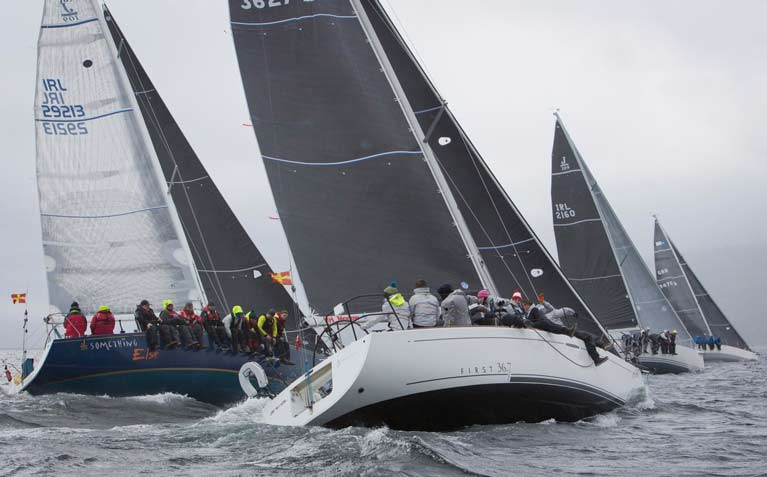 Scottish RC35 champion Animal to windward after a start with Dun Laoghaire's blue-hulled Something Else to leeward Photo: Marc Turner
Scottish RC35 champion Animal to windward after a start with Dun Laoghaire's blue-hulled Something Else to leeward Photo: Marc Turner
Class RC 35
The RC35 class is interesting as it is the only one holding up its numbers. There is a rating band applicable from 1.010 to 1.040 and it has a good following in Scotland. Pat Kelly's J109 Storm II from Rush and Howth, also competes regularly in this class. Storm was the 2018 Class and overall winner of Scottish Series. Other than that, three further Irish boats made the voyage to the Clyde, two J109s from Dun Laoghaire, Andrew Craig's Chimaera and Brian and John Hall's Something Else. Stuart Cranston from Strangford Lough brought the Ker 32 Hijacker for her first outing under new ownership. This Ker had been sailing previously during the last two years in Scotland.
The Top Scottish boat was reckoned to be the Beneteau 36.7 Animal, which had won the Kip Regatta (with Storm second) a fortnight earlier. However, that was a light series and it became apparent that Animal, is not quite the same Animal, when the breeze freshened. The top Scottish boat turned out to be the Corby 33 Jacob VII in fifth place.
The top four places overall ended up being the four Irish boats. Even on Individual races, only Irish boats won races, with Hijacker taking three wins, Storm taking two and Chimaera taking one.
"The win in this very competitive class also gave Andrew Craig the Overall Scottish Series Trophy"
It's not all about winning races though, and Chimaera’s Consistency, with Prof O'Connell calling the shots, never finished outside the top four in any race and gave her the win overall. Both Hijacker and Storm had at least one average race and so Hijacker finished second overall, with Storm third, and a solidly sailed Something Else took fourth.
The win in this very competitive class also gave Chimaera and Andrew Craig the Overall Scottish Series Trophy and was well deserved.
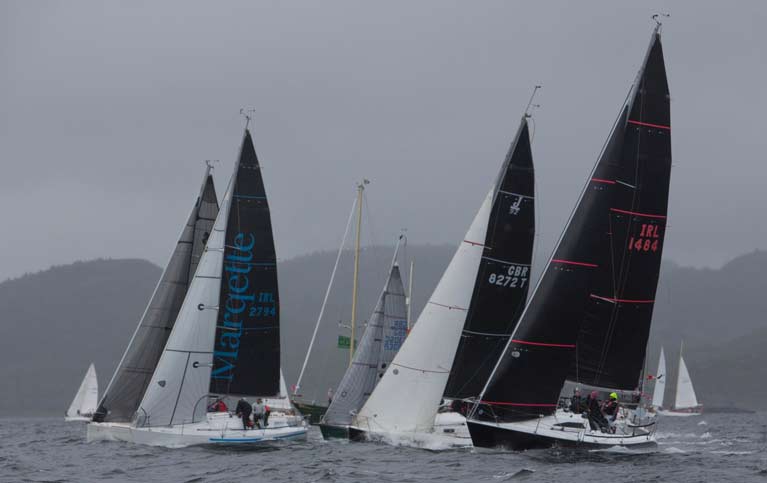 A class three start with Mata (second from left) and overall winner Harmony (right) Photo: Marc Turner
A class three start with Mata (second from left) and overall winner Harmony (right) Photo: Marc Turner
Class 3
Six entries. It was clear from early on that the two modified and upgraded Half tonners from Howth, Johnny Swan's Harmony, and the newly acquired Mata of D and M Wright were going to be the ones to beat. They had their own personal battle, eventually being won by Swan's Harmony. However, when you look at the results and know the story, you will see that it was – or could have been – a very close affair. Mata was the boat disqualified in race three by the Jury for being in the starting area when a previous class was starting. They then went on to win that race but lost it in the protest room. In a no discard series, they ended second overall, but would have won it, had they not been disqualified.
Class 4
Seven entries. This was a one-sided affair, with Rory Fekkes' highly modified First Class Eight winning every race, bar one, to take the overall win from Lady Ex. The only race she lost was due to being OCS in that race, requiring her to return to the line. In the long, around the Loch race, where she was able to plane easily, she won by eight minutes. We will have to wait and see if the Dublin Bay Quarter Tonners and other top boats in Dublin will give her a closer run in next week's ICRA championships in Dun Laoghaire. If the breeze is up in that event though, she will be the one to beat.
 After race partying at Tarbert. The social side of the Scottish Series makes it a great event Photo: Marc Turner
After race partying at Tarbert. The social side of the Scottish Series makes it a great event Photo: Marc Turner
Ashore
Socially, It was, as always, a great event. Post-race drinks in the beer tent were always good, followed by a few more in the Corner House and then later in the night the tent got going again with bands and Ceili Scottish dancing every night, for those who wanted it. The RC35 Class had a great dock party on the Sunday afternoon after racing, kindly sponsored by The Kelly family team from Storm.
This regatta is really worth coming to and is a great warm-up event for those wanting to get a head start in the season.



























